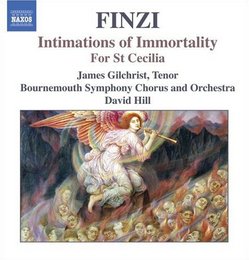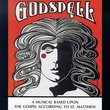| All Artists: Gerald Finzi, David Hill, Bournemouth Symphony Orchestra, James Gilchrist Title: Finzi: Intimations of Immortality; For St. Cecilia Members Wishing: 0 Total Copies: 0 Label: Naxos Original Release Date: 1/1/2006 Re-Release Date: 5/16/2006 Genre: Classical Styles: Opera & Classical Vocal, Symphonies Number of Discs: 1 SwapaCD Credits: 1 UPC: 747313286324 |
Search - Gerald Finzi, David Hill, Bournemouth Symphony Orchestra :: Finzi: Intimations of Immortality; For St. Cecilia
 | Gerald Finzi, David Hill, Bournemouth Symphony Orchestra Finzi: Intimations of Immortality; For St. Cecilia Genre: Classical
|
Larger Image |
CD DetailsSimilar CDs
Similarly Requested CDs
|
CD ReviewsMajor Finzi, indeed! jean couture | Quebec city - Canada | 09/25/2006 (5 out of 5 stars) "This disc has already gathered a lot of rave reviews to which I can only add my modest appraisal -a positive one- in matters of sonics and interpretive eloquence. I applaud this Naxos release, for beyond doubt it is one of the great Finzi discs. Unless the Partridge Lyrita SRCS75 is pulled out from the crypt and resurrected on cd (that's, hopefully, probable), this excellent Naxos recording will fill the bill as the finest inquiry into Wordsworth's Intimations. Missing only an ounce of limpidity as well as, admittedly, the verve of the Partridge (exemplary in terms of vocal and orchestral fluence as much as in the qualities pertaining to recorded sound), the Naxos brings together two of Finzi's greatest works in quite superb, efficient renderings that contradict the `budget price' tag affixed on its jewel case. Deservingly, conductor David Hill is taking his due place among Britain's most renown musicians. He has worked on a good deal of recordings (notably for Hyperion) in organ and choral music, including a noteworthy account of Elgar's Gerontius with the Bournemouth forces and Waynflete Singers (also on Naxos). Finzi's orchestration is followed with attention to detail; the rhythmic pulse is taut without sounding overbearing. The performance does not ignore that sort of melodic contour which is typical of the composer. The Bournemouth S.O. under Hill's astute command has `captured' the finzian mood quite well, while tenor Gilchrist's voice is magnificent. The filler, the ode `For Saint Cecilia', is very good as well and carries near demonstration-quality sound. In case I haven't made my point sufficiently clear : This album is quite a nice accomplishment." A Major but Rarely-Heard Finzi Work J Scott Morrison | Middlebury VT, USA | 06/10/2006 (4 out of 5 stars) "Much as I like the music of Gerald Finzi (1901-1956) I had never heard his largest work -- the longest at any rate, at almost forty minutes -- 'Intimations of Immortality' for tenor, chorus and orchestra. Based of course on Wordsworth's poem that sings of the instinctual freshness and sensitivity of childhood and laments its passing when one passes into adulthood, it is a heartfelt work from Finzi whose own childhood and youth were painful, lonely and tragic, and whose escape into music and literature set his course in adulthood, an attempt to keep that child's responsiveness alive in himself. Finzi set nine of the eleven stanzas of the Wordsworth poem -- VII and VIII are omitted -- with orchestral interludes between each of them, and it took him almost twenty years to complete, interrupted as it was by the horror of the Second World War. He finished it in 1950. The central theme of the poem (in IV) -- 'Whither is fled the visionary gleam? Where is it now, the glory and the dream?' -- is set to somber tones and is ultimately answered by the 'intimations of immortality' in IX and X -- 'O joy! that in our embers / is something that doth live ... in the faith that looks through death.' Clearly this is a deeply personal work for Finzi.
Tenor James Gilchrist and the Bournemouth Symphony Chorus provide appropriate musical expression for Finzi's setting of the alternately troubled, rapt or joyous discourse of Wordsworth's poem. The Bournemouth Symphony is its usual expert self under the direction of David Hill. The CD is filled out with a performance of Finzi's setting of a 'Ceremonial Ode' by Edmund Blunden, 'For Saint Cecilia' written specifically for a celebration of St. Cecilia's Day in 1947. Although there is some enjoyable ceremonial music here, particularly in the use of Waltonian fanfare motifs, this is public and rather impersonal music that, for me, doesn't particularly warrant frequent hearing although it is expertly done here. Scott Morrison" |

 Track Listings (18) - Disc #1
Track Listings (18) - Disc #1










